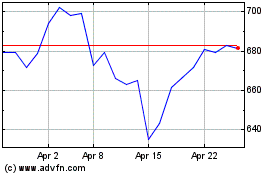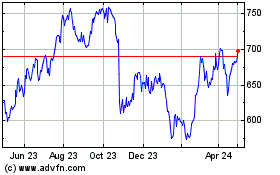Banks Restrict Travel, Cancel Functions, Warn of Slower Growth -- WSJ
February 28 2020 - 3:02AM
Dow Jones News
By Simon Clark, Patricia Kowsmann and Ben Dummett
This article is being republished as part of our daily
reproduction of WSJ.com articles that also appeared in the U.S.
print edition of The Wall Street Journal (February 28, 2020).
LONDON -- Banks with heavy exposure to Europe and Asia have
warned profits could be hit by the coronavirus outbreak as they
tell employees to restrict travel and initiate special measures to
help customers.
Banking stocks sold off heavily Thursday with shares in several
European lenders falling more than 7%. Those retreats outstripped
declines in broad stock market indexes, which slid toward
correction territory as virus concerns continued to roil global
markets.
The spread of the virus will make it more difficult for
Asia-focused, London-based Standard Chartered PLC to hit its
financial targets, Chief Executive Bill Winters said as the bank
warned that profit growth would slow this year.
That warning comes after rival HSBC Holdings PLC said earlier
this month that it could take up to $600 million in additional loan
loss provisions if the crisis extends into the second half of the
year.
Other banks are curbing travel plans, canceling functions,
conducting business by videoconference and circulating employee
hygiene advice as disruption caused by the virus spreads. Some have
introduced relief measures for customers, such as delaying mortgage
repayments.
For Standard Chartered, the fallout from the virus coupled with
other political headwinds make for a gloomy short-term outlook. Mr.
Winters declined to estimate a cost of or worst-case scenario for
the impact of the virus but said the bank is in a strong financial
position to withstand any outcome.
"We have not put a number on it," he said, adding that his
"singular focus" was to get the bank through "a bumpy period."
A quarter of Standard Chartered's Hong Kong branches are closed
and there are no face-to-face services in some mainland China
branches as a precaution due to the coronavirus outbreak, the bank
said. It said some clients affected by the virus can delay
repayments on mortgages and business loans. The bank also said it
is waiving fees on personal loans, and extending the repayment
dates of companies' trade finance loans.
Elsewhere, most banks are following advice from the World Health
Organization, with several imposing restrictions on travel to China
and Italy.
Citigroup Inc. told employees that all travel into, between and
out of all countries in the Asia-Pacific region must be approved by
their chief country officer. JP Morgan Chase & Co. employees
also need line-manager approval for travel to Italy. HSBC told
staff not to book travel to Hong Kong until after April 20, and has
banned travel to mainland China until further notice.
Deutsche Bank has imposed staff travel restrictions to and from
mainland China, Hong Kong, the affected parts of Italy and South
Korea. It asked staff to defer all nonessential travel.
"We continue to monitor the government authorities' assessment
and advice and change our procedures accordingly," the bank said in
a statement. "We have analyzed where our staff's exposure to the
virus may be greatest and are working with local offices to
minimize the risk to local staff and travelling populations."
Deutsche Bank also changed the format of a discussion on the
state of the global economy due to take place in Frankfurt Thursday
evening so that its senior economists could join by videoconference
from London and New York, avoiding travel, replacing a sit-down
dinner with a cold buffet to make the event easier to hear.
Banks are relying on videoconferencing and other methods of
communication to ensure the coronavirus fallout doesn't impede
their ability to compete for business. Italy-based SIA SpA is
pursuing a possible initial public offering, and some banks without
a significant presence in Milan where the payments company is based
are pitching for an underwriter role remotely because of their
in-house travel restrictions, according to people familiar with the
matter. Some Milan-based bankers are still making their case in
person, some of the people said.
Bankers said that the broad market selloff is pushing companies
in sectors such as energy, retail and travel -- whose businesses
are at particular risk because of the virus -- to put on hold any
IPO plans that they had been considering, but not made public.
That said, the market volatility hasn't interrupted SIA's plan
for a possible IPO, which was announced earlier this month and
remains on track, according to a person familiar with the
matter.
A spokesman at Swiss bank Julius Baer Group AG, said it is
restricting travel in general, and in particular to the affected
regions. Earlier this month, it sent 100,000 medical masks to China
to help control the outbreak. The spokesman on Thursday said it has
a supply of masks for its staff in Asia and Switzerland.
At a conference on financial transaction clearing in Frankfurt
Thursday, attendees and speakers from banks and stock exchanges
were assessed at check-in by an infrared camera measuring body
temperature, according to the organizer. "Our security and
paramedic will approach you in case of any indication," a note at
the entrance said.
Outside, an ambulance was on standby.
Margot Patrick and Tom Fairless contributed to this article.
Write to Simon Clark at simon.clark@wsj.com, Patricia Kowsmann
at patricia.kowsmann@wsj.com and Ben Dummett at
ben.dummett@wsj.com
(END) Dow Jones Newswires
February 28, 2020 02:47 ET (07:47 GMT)
Copyright (c) 2020 Dow Jones & Company, Inc.
Standard Chartered (LSE:STAN)
Historical Stock Chart
From Mar 2024 to Apr 2024

Standard Chartered (LSE:STAN)
Historical Stock Chart
From Apr 2023 to Apr 2024
